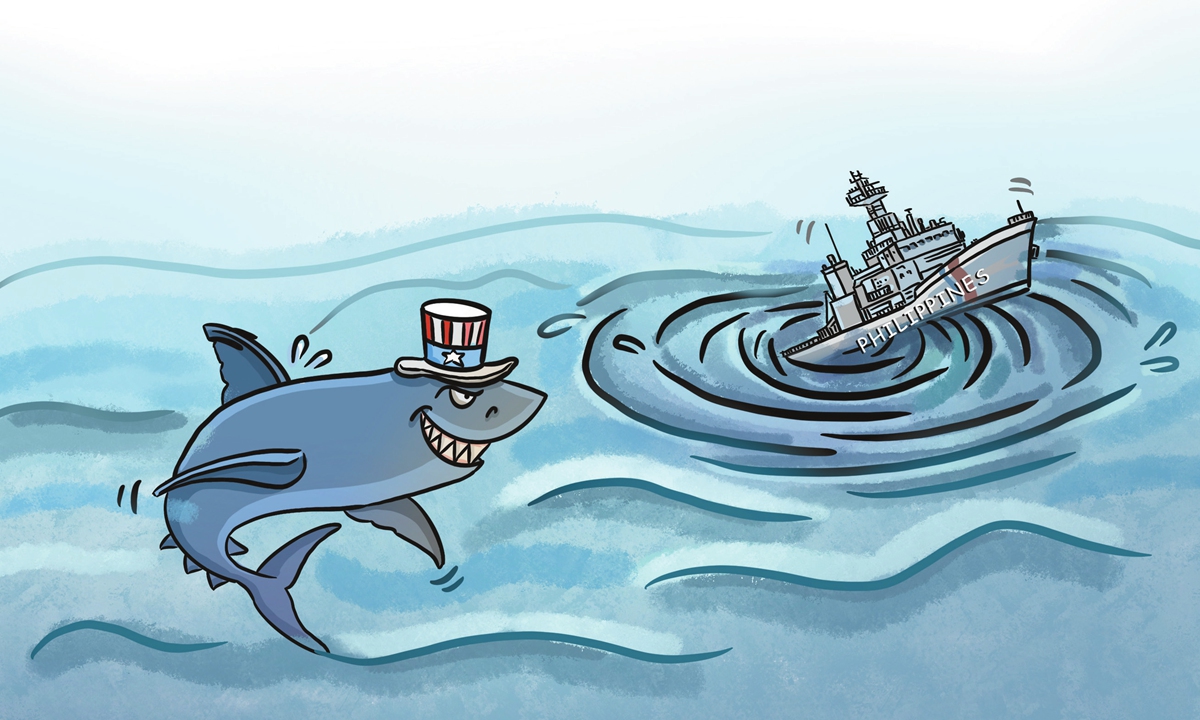
Illustration: Xia Qing/GT
Editor's Note: Recently,
mk the Philippines has intensified its criticism of China's routine patrol operations in the South China sea, referring to the China Coast Guard vessel as a "monster ship." How will the Philippines' latest provocations affect the situation? How will the South China Sea situation develop this year? Is there any potential for improvement in China-Philippines relations? In an interview with Global Times (GT) reporter Wang Zixuan, Severina Melissa Hubahib Loja (Loja), former vice-chair and professorial lecturer of maritime and international law at the Philippine Judicial Academy and now a postdoctoral fellow of the Faculty of Law at the University of Copenhagen, stated that no American soldier will be sacrificed to defend the Philippines' claim to tiny rocks in the SCS, and that neutrality is the policy that would best serve the Philippine interest.
GT: On Monday, the Philippines claimed that it filed a diplomatic protest to counter Beijing's continued "illegal" activities in the South China Sea. However, it is Manila that keeps provoking China over the South China Sea issue, including the passage of two maritime laws in November to assert claims over the South China Sea, which triggered opposition from China and Malaysia and exacerbated tensions in the region. Are Manila's actions controversial within the Philippines?
Loja: There is no longer public discourse in the Philippines. The academe and media have become a captured social force. They have become uncritical. For them, anything that maligns China is considered good and true. The few genuine experts in international law are silenced or ignored. Instead, those who have not actually studied international law but echo what the public wants to hear, that is, anti-China rants, shape the narrative. As a consequence, the so-called Maritime Zones Act or Archipelagic Sea Lanes Act were passed without critical analysis.
GT: Last month, the Philippines reaffirmed its interest in purchasing Typhon missile systems from the US. What does this mean for Philippine security? Is this weapon system a "security guarantee" or a "security liability" for the Philippines?
Loja: Whether through purchase, joint use, or pre-positioning, and regardless of range (long-range, mid-range or short-range), the presence of Typhon missile systems or any weapon system with remote or cross-border programming, targeting, navigation, operations, and control, endangers Philippine security.
In the case of the Philippines, it is a territory already hosting US missile systems. There is no defensive purpose served by such a missile system. There is no logic in deploying from the main Philippine territory missiles against China and inviting preemptive or retaliatory strikes in the process. The presence of US missile systems in the Philippines makes the Philippine territory and its population legitimate but sacrificial targets.
GT: The US has repeatedly claimed that it will defend its treaty ally, but some commentators believe this is always an empty promise. Do you think the US will stay committed to the Philippines regarding the South China Sea issue?
Loja: No American soldier will be sacrificed to defend the Philippine claim to tiny rocks in the South China Sea.
GT: You have called on the Philippines to "remain neutral" between China and the US. Such views are somewhat different from the current policies adopted by the current administration in Manila. Why do you advocate for this? Do you feel any pressure within your country?
Loja: Neutrality is the policy that would best serve the Philippine interest. The interest of the Philippines is to be a peaceful and prosperous country and to help build a peaceful and prosperous Southeast Asia. This interest will be fulfilled only by ensuring that the country and Southeast Asia are not dragged into a cold war or hot war among great powers. Our Southeast Asian neighbors have been loudly reminding us of this truism.
By allowing the US, one of the belligerent or quasi-belligerent powers, to pre-position missile systems in its territory, the Philippines has turned itself into a direct participant and a magnet for retaliatory or preemptive strikes. It sacrifices the interest of the Filipinos for the interest of the American elite. It fails to learn from the hardship and devastation that Ukraine is now experiencing, especially when one bears in mind that our conflict with China is merely over tiny rocks.
Neutrality does not mean sacrificing territorial or maritime claims. It means negotiating with all the claimants, excluding external actors from the negotiations and continuing to cooperate in areas where there is common interest.
My views are considered controversial in the Philippines. I have always wanted to teach and conduct research in Philippine universities, but I was victimized by a cancel culture. I had the unfortunate experience of being blocked from the University of the Philippines. I was labelled as an agent of China. This accusation was based on the citation of my research works by Chinese scholars, omitting to mention that the same research works are cited by American and European scholars. Consequently, I am forced to teach and research abroad, rather than help upgrade the knowledge of Filipinos in international law and counter misinformation and disinformation in the Philippines regarding international law in general, and the South China Sea dispute in particular.
GT: In your view, where is the potential for improvement in China-Philippines relations this year? If you were to advise the current Philippine government, what kind of relationship with China do you think would be beneficial for the Philippines' interests?
Loja: The Philippines should not have the military or the national security adviser as the primary actor in the South China Sea. Instead, it should be the Philippine foreign affairs department defining the strategic goals, designing the modes of engagement and undertaking various levels of negotiations. The South China Sea issue between the Philippines and China can only be resolved through negotiation; armed conflict will not make any of the claimants go away.

